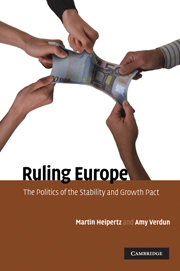Book contents
- Frontmatter
- Contents
- List of tables
- Foreword by Jean-Claude Juncker, Prime Minister of Luxembourg and President of the Eurogroup
- Preface
- Acknowledgements
- List of abbreviations
- 1 The politics of the Stability and Growth Pact
- Part I
- 2 States, intergovernmentalism and negotiating the SGP
- 3 Opening the box: A domestic politics approach to the SGP
- 4 The functional logic behind the SGP
- 5 The role of experts and ideas
- Part II
- Appendix
- Bibliography
- Index
3 - Opening the box: A domestic politics approach to the SGP
Published online by Cambridge University Press: 06 July 2010
- Frontmatter
- Contents
- List of tables
- Foreword by Jean-Claude Juncker, Prime Minister of Luxembourg and President of the Eurogroup
- Preface
- Acknowledgements
- List of abbreviations
- 1 The politics of the Stability and Growth Pact
- Part I
- 2 States, intergovernmentalism and negotiating the SGP
- 3 Opening the box: A domestic politics approach to the SGP
- 4 The functional logic behind the SGP
- 5 The role of experts and ideas
- Part II
- Appendix
- Bibliography
- Index
Summary
Presenting the domestic politics approach
Some European integration scholars found intergovernmentalism and its focus on nation state interests on its own insufficient to explain the process of European integration (Bulmer 1983; Webb 1983). Intergovernmentalism was criticised for looking at the state as a ‘black box’. Based on comparative politics and political economy approaches, domestic politics scholars stressed that, in order to understand state preferences, one would want to analyse internal dynamics of the state and appreciate the importance of the domestic political context (Huelshoff 1994). National elections, domestic structures, constituencies and sensitivities, later also called ‘national identities’, were seen to have a crucial impact on the way the EU is perceived by the national government as being an instrument to obtain domestically important objectives. Likewise, the domestic scene may impose a constraint on the national government which then would affect the way it operates at the European level, for example to secure its national interests in negotiations.
Scholars who emphasise the importance of domestic politics argue that there are certain domestic actors that are significant in understanding the outcomes of the European integration process. These actors are: the national government, party leaders, the opposition, the general public, interest groups, corporations, the media and so on.
Not only are the actual actors important, but the domestic institutional setting and the institutional structures in which they operate also play a role.
- Type
- Chapter
- Information
- Ruling EuropeThe Politics of the Stability and Growth Pact, pp. 42 - 63Publisher: Cambridge University PressPrint publication year: 2010



